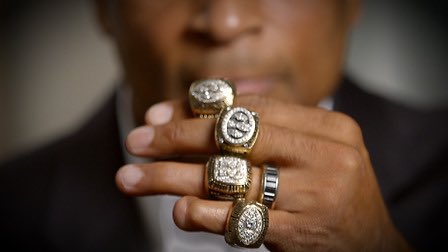 Dedication is a funny thing. There are some people out there who are willing to suffer, and sometimes die, for their passion. For example, Ludwig Van composed his “greatest works…including the Ninth Symphony” (Hyperhistory.com) while completely deaf. Marie Curie died of “aplastic anemia from exposure to radiation” (Wikipedia.org) caused by her research. And then there’s Ronnie Lott.
Dedication is a funny thing. There are some people out there who are willing to suffer, and sometimes die, for their passion. For example, Ludwig Van composed his “greatest works…including the Ninth Symphony” (Hyperhistory.com) while completely deaf. Marie Curie died of “aplastic anemia from exposure to radiation” (Wikipedia.org) caused by her research. And then there’s Ronnie Lott.
I don’t watch the Super Bowl, but I am aware enough to know that it just happened. It reminded me of a story my best friend, a hardcore football fan (and former player), once told me about a football player who broke his finger during a game. Because this gentleman was concerned about not being able to play, he had the doc cut off said broken finger. When my friend told me about Ronnie Lott, I could see that maniacal glint of the true believer in his eye. My friend seemed almost wistful that, besides his knees, he couldn’t sacrifice more to the game.
In 1981, Lott was drafted by the San Francisco 49ers where he went on to “win eight division titles and four Super Bowls” (Wikipedia.org). There is also a trophy named after Mr. Lott that “is the only college football award to…recognize athletic performance and the player’s personal character attributes” (NBClosangeles.com). In addition, Mr. Lott “was inducted into the Pro Football Hall of Fame in 2000” (Fanbuzz.com). These are really impressive achievements. But what was that about an amputated finger again?
I had heard that Mr. Lott broke his pinky during a game and then had the doctor amputate it in the locker room so he could return to the game, unencumbered. This is only sort of true. While it is factual that he broke his finger and it is factual that he returned to the game with it taped up, Mr. Lott didn’t have some bizarre Dr. Frankenstein hack his finger off amid dirty jockstraps.
According to Dan Brown, author of “100 Things 49ers Fans Should Know & Do Before They Die,” Mr. Lott was given the choice to go through a long surgery that would keep him sidelined for a minute or to have his finger amputated just above the first joint. He chose the second option and was back in time for the 1986 football season.
This sort of dedication is admirable, but is it good for you? How much are you willing to give up for a job, no matter how passionate you may be about it? Forbes.com suggests that if you give too much, your “tireless work ethic” will not be valued, as everyone is so “used to seeing you killing yourself.” It becomes rather a situation like: Ho hum, Employee A worked all weekend. Again. In addition, according to Forbes.com, your blind dedication can cause you to pass up offers that could turn out to be better for you in the long run. Dedication and loyalty are great things, just not if they mean you end up hurting yourself.
I don’t have to tell you how dedicated Bourke Accounting bookkeepers and tax preparers are. During this tax season, our Bourke Accounting reps are giving up family and free time to make sure that your financial needs are well met. However, as devoted as they are, they still understand that there are more important things in this life than the job – just try to keep Bill in the office if his pup, Loretta, gets sick! At Bourke Accounting, we’re willing to sacrifice for the game, just not all the way.
Come see us any time. Our number is 502-451-8773 and don’t forget to visit our website at www.bourkeaccounting.com. See you soon!
You just made it onto the elevator because the gentleman inside held the door for you. You find that the button for your floor, the 23rd, is already lit up. You nod “thank you” to the guy and face the door. The elevator, notoriously slow, begins to rise. And then. Oh, no. “What about this rain, huh?” Oh, no, no, no. It is first thing in the morning, you are on a very slow-moving elevator and you are trapped with a small talker. There is no escape.
As humans, we are generally forced into small talk every day. Most instances are quick: May I have $20 on pump 3? – waiting for receipt to print – how’s your day going? You’ve acknowledged the person in front of you, shown yourself to be polite and now you can go on your way. However, there is some small talk that seems to go on for pointless eons. Why do we do it to ourselves?
According to Englishclub.com, the first reason we commit small talk is “to break an uncomfortable silence.” Yup, nothing like breaking an uncomfortable silence with an even more uncomfortable conversation. Englishclub.com also says that we make small talk “simply to fill time.” Not all time needs to be filled, fellas.
For example, I was in a waiting room, reading a book. The woman next to me asked my opinion about the Family Feud episode on the TV. I smiled, said that I hadn’t been watching and went back to my book. I thought I was politely avoiding a long conversation about the antics of Steve Harvey, but I was mistaken. No amount of noncommittal “uh huhs” deterred her. I was overly excited when my gynecologist came to collect me.
If you Google “how to avoid small talk,” don’t expect tutorials teaching how one may dodge useless conversations with strangers. Instead, the articles advise how to make small talk more substantial and interesting. Fairygodboss.com suggests asking “open-ended questions that prompt stories instead of answers.” In addition, if the person is talking about something that bores you, you’re meant to redirect their attention to something in the room. I’m not kidding. Point at a painting and say “Pretty!” to stimulate deep and meaningful conversation.
Wikihow.com offers advice to avoid talking to people, period, but it reads like a serial killer’s manifesto. For example, one tip is to “avoid interaction altogether.” Wikihow.com recommends that “ignoring others and remaining distant is a sure way to avoid conversation.” Well, they’re not wrong.
There should be a middle ground for small talk: 5 minutes or less of pleasant fluff-filled sentences that are so innocuous that you can’t recall them after. But, at the 5-minute mark, both conversationalists are free to shake hands and walk away. If we did it this way, there would be no more subtle slide towards the door when one participant is desperate to flee.
Bourke Accounting specialists are professional, so they know how to engage in small talk. However, Bourke Accounting specialists are also very interesting, so it won’t feel like small talk. By the time your appointment with a Bourke Accounting accountant or bookkeeper is completed, you’ll find yourself entertained, well taken care of and infinitely more financially informed than you were before. And hey, we have paintings!
Come see us any time. Our number is 502-451-8773 and don’t forget to visit our website at www.bourkeaccounting.com. See you soon!
Written by Sue H
Judge a man by his questions rather than by his answers – Voltaire
Have you ever had an almost total stranger ask you extremely personal or inappropriate questions? Like, if parts of your body are real or how much money you make? I think everyone has had this experience. Every time this happens, I’m left with a dumbfounded expression and complete confusion banging in my skull. I wonder what makes a person so clueless that they demand information that most of us wouldn’t even tell our therapist.
For example, when I first landed in Louisville, years before I entered the civilized world of Bourke Accounting, I took a job at a convenience store. My first (and only) night there, I was being trained by a rather interesting woman. Within the first 20 minutes, she asked how many children I had. When I told her that I didn’t have any, she looked me up and down. “Oh, are you barren?” Uh, no, I don’t think so. “What, can’t you find a man?” Okay, we’re done here.
F. Diane Barth, writing for Psychology Today, gives these people the benefit of the doubt. One of her top reasons that people ask uncomfortable questions is that “they really do not realize that what they are asking is not OK.” She goes on to propose that the inquisitor might be suffering from some sort of personality disorder or an “inability to empathize with someone else’s feelings” (Psychologytoday.com). The National Institute of Mental Health reports that “nearly one in five US adults live with a mental illness,” so, I suppose that this could be the case…
Sarah Lynch, writer for (and founder of) BucketOrange Magazine isn’t quite as forgiving. Her premise is that some people ask these personal questions to put themselves in a “powerful position to use that information against you…in the future.” So far, our two options are that someone is mentally unbalanced or out to get us. Someone please remind me why I leave my house.
Barth, that perennial optimist of Psychology Today, also suggests that another motivation for nosy questions is that these people are legitimately interested in helping. She uses the example of an aunt asking her niece if she really needed an extra plate of food. It turns out that the aunt had been heavy and, perhaps, wanted to save her niece from harassment later. At least this logic doesn’t make me want to run and hide, but it’s still an intrusive and ill-mannered line of questioning.
So, what do you do if you’re asked an indelicate, personal question? As you might have suspected, most advice is focused around taking “the high road.” Even if someone is aware of the audacity of their interrogation, “you should never stoop to getting back at them with bad manners” (TheSpruce.com). Instead, if you choose not to answer, you are encouraged to “use humor to soften your response and then change the subject.” And hope the person gets the hint.
Humans are social animals. Being such, you are probably going to get an offensive question here and there. Maybe Bourke Accounting is making me gentler, but next time, I’m going to tell a “Knock, Knock” joke, smile and walk away.
Our Bourke Accounting reps are not socially dysfunctional. From what I can tell, Bourke Accounting accountants and bookkeepers aren’t mentally ill and they are definitely not out to get you. You’ll be asked some personal questions, but only as they pertain to your financial situation. Bourke Accounting specialists won’t ask why you’re not married, why you have no kids, why you have 3 kids. In other words, you will never feel uncomfortable while talking with your Bourke Accounting specialist.
Come see us any time. Our number is 502-451-8773 and don’t forget to visit our website at www.bourkeaccounting.com. See you soon!
Written by Sue H.
This morning, my alarm told me that it was time to get up for a new day at Bourke Accounting. I put my feet on the floor and my toes went: Snap, Crackle, Pop. I stood up and my knees said: Bing, Bong, Blip. I bent down to kiss the dogs and my back – being very vocal this morning – announced: Crick, Chhhzzzz, Bork.
It seems that, as soon as I hit 29, my body started making funny noises. It must be said that I don’t exactly take care of myself: I don’t get enough sleep, my diet is the same as it was during my starving college days (even though I have the knowledge and resources to eat better now, I still love SpaghettiOs) and I don’t drink enough water.
So, when Bill gave me a copy of The Week with an article about Kane Tanaka, I was intrigued. Ms. Tanaka is a “Japanese great-great-grandmother [who] celebrated her 117th birthday last week” (The Week – Volume 20, Issue 958). She is now in the Guinness Book of Records as the oldest person in the world. After receiving her Guinness certificate, she planned to celebrate by “eating 100 pieces of chocolate” (Thenational.ae).
Every time someone surpasses the standard human lifespan, we ask, well, how did they do that? In Ms. Tanaka’s case, she gets up early, she spends her afternoons studying math and “challenging other care home residents to a round of Othello, her favorite board game” (Thenational.ae). However, perhaps the biggest attributing factor to her longevity might be her eating habits (the 100 chocolates was a fluke, not a habit).
In Japan, there is a dietary practice referred to as “hara hachi bu.” Roughly translated, this means, “belly 80 percent full” (Marieclaire.com). It’s a Confucian “way of life that involves eating only until you are 80 percent full each day” (Marieclaire.com). According to Bluezones.com, this process could explain why Okinawa, for example, “has a higher percentage of centenarians that anywhere else in the world.” It also doesn’t hurt that the Japanese diet is traditionally pretty healthy and high in “Omega-3 fats, known to protect against heart disease” (Thenational.ae).
The benefit of hara hachi bu is apparent when one compares the average caloric intake between a Japanese resident and, say, an American: for men, it’s the difference between 1,900 and 2,500. However, let’s not forget that when the American man hits his 40s, he’ll be “topping out at an average of 2,692” calories (Bluezones.com). Also (again brought to us by Bluezones.com), hara hachi bu stresses eating slowly, paying attention to what you’re digging into (meaning: turn off the TV/computer and actually taste your food) and using “small vessels.” If you put your food on a smaller plate, you’ll naturally eat less and, it’s suggested, that you won’t even notice you’re doing it.
We are not total health nuts at Bourke Accounting (well, Phil might be, he looks awesome), but we know a thing or two. Our Bourke Accounting practitioners are aware that, in order to give you the best in accounting and bookkeeping services, they need to be well-rested and feeling good. We’d like it if you were feeling your best, too. A Bourke Accounting specialist won’t be able to give you eternal youth, but if you allow one of our representatives to assist you with your financial issues, you may find that you sleep better at night. Hey, it’s even possible that you’ll sprout less gray hair with the knowledge that you are in very capable hands.
Come see us any time. Our number is 502-451-8773 and don’t forget to visit our website at www.bourkeaccounting.com. See you soon!
Written by Sue H.
 I’m pretty sure that this has happened to you: you are attempting to buy something at the corner store. Annnnd…the cashier is more entranced by the cellphone than the live and paying customer who is standing right here. I mean, it’s great that you made it to level 400 of Candy Crush, but could you take my money, please?
I’m pretty sure that this has happened to you: you are attempting to buy something at the corner store. Annnnd…the cashier is more entranced by the cellphone than the live and paying customer who is standing right here. I mean, it’s great that you made it to level 400 of Candy Crush, but could you take my money, please?
At Bourke Accounting, we’re allowed to have our cellphones. During my original interview, Bill told me that, as we’re all adults, responding to a text every once in a while isn’t a big deal. But, he emphasized, if the phone usage became excessive, there was going to be a problem and we’d have to revisit the subject. That sounded fair to me. From 8-5 (8-7 during tax season!), I realize that my priority is my job and I don’t need to see funny puppy videos right now. Admittedly, I am not as pure as the driven snow over here, but so far, no one has had to smack my nose.
At this point, most workers have cellphones. I don’t have to tell you how convenient this invention is, but, as with everything, there’s a downside. For example, “19% of employers think their workers are productive for less than five hours a day and more than half believe that cellphones are to blame” (SBA.thehartford.com). In addition, according to The New York Post, a study claims that, because of electronic devices, there is “$15 billion in lost productivity” annually.
Of course, that one guy playing Minecraft in his cubicle is bad enough; what I truly hate, though, is someone else’s loud conversation that I can’t escape (this doesn’t happen at Bourke). I’m trying to work and someone else is engaged in a very personal dialogue with their doctor. No, no, I don’t want to know what the rash looks like, I don’t want to know where on your body it’s located and I sure as anything don’t want to know what colors are coming out of it. Am I the only one who wants to bring back phonebooths?
There seems to be two schools of thought regarding what to do about the cellphone issue. Cathy Hotka (of Cathy Hotka and Associates) says that, if your employees aren’t being productive, “your response isn’t to complain – just fire them” (Forbes.com). Maybe it’s my bleeding heart again, but this seems a bit harsh. However, if a worker is reprimanded more than once and the behavior remains unchanged, there might not be any other option.
The other school of thought leans toward the restriction, not banning, of cellphones. While there is no law actively stating that an employer “cannot implement a policy prohibiting cellphones” (Paycore.com), Paycor.com warns that completely banning phones “would likely decrease employee morale.” They suggest that phones be kept in lockers or drawers except during breaks. Also, they suggest setting up another phone line in the reception area that is strictly for employee emergencies in order to circumvent arguments from concerned employees with children.
Our Bourke Accounting professionals know how to stay focused. You will not be interrupted, mid-appointment, by Bill or Tim stepping out to take a friend request. When you see a Bourke Accounting expert, you will have their 100% dedication and attention. Eh, you might want to turn your phone off, though. You can always watch cute kitties doing cute things after you’ve received the best in accounting and bookkeeping services, right?
Come see us any time. Our number is 502-451-8773 and don’t forget to visit our website at www.bourkeaccounting.com. See you soon!
Written by Sue H.
I have conducted job interviews and I have hated it. In the beginning, I wanted to hire everyone who walked through the door. It took 3 bad disappointments to make me not want to hire anyone. For example, there was the guy who couldn’t figure out how to operate a cup. A drinking cup. A plain, plastic cup. He smelled like a chemical explosion occurred at his house 10 minutes before his interview but, to be fair, once I transferred his water to a mug, he got the hang of it.
I admit that I was burned out. Eventually, if someone showed up wearing a shirt and didn’t have anything too terrible on that pesky police record, they had a job. I once asked thoughtful questions. After a while, I queried: if you were a can of soup, what kind of soup would you be? Some laughed and gave me a random answer. Some stared blankly at me until I changed tact and questioned their attendance at their last job.
There’s no doubt about it – no matter what side of the table you happen to find yourself, it’s a hellacious experience. Obviously, asking about what kind of animal, soup or car one would be are stupid questions that don’t give any information about the person being interviewed. And, it must be remembered, that the person interviewed for a job is not necessarily the employee you’ll encounter 6 months down the road (I had a boss who was convinced that he had, in actuality, interviewed my classy twin sister). During interviews, we try to present ourselves as engaged, intelligent and super duper sweet. Overtime? Sure, no problem! Nooo, I don’t have an issue working a weekend here and there. We tend to agree to anything if the job looks good enough.
So, as an employer, how do you know what to ask that will really tell you something about your prospective employee? The February 2020 issue of The HR Specialist included some of their readers’ favorite interview questions. For example, “What is the biggest work disaster you’ve been a part of? What role did you play?” The person who posed this question pointed out that if you don’t get a straight answer, that tells you a lot. However, if you do get a straight answer, you “learn even more.”
Another good question, also provided to us by TheHRspecialist.com, asks “what kind of supervisor brings out your peak performance?” This is a great question because it forecasts to the employer what the prospective employee expects and wants in a boss. If the employee says that only a laidback, hippie boss will do and you happen to be an anal-retentive curmudgeon, you’re probably going to experience some friction if you continue with the hiring process. I think this question is probably the most important for both employer and employee.
Obviously, the first question to a would-be employee is: can you do the job? After that, you have to find out if your personality will match with the employee. Of course, this is difficult to ascertain within the confines of a 15-minute interview, but, come on, we all sort of know within 15 minutes if someone gets on our last nerve or not.
As someone who interviewed with both Christina and Bill, I can tell you that they’re not scary. In fact, all of our Bourke Accounting professionals are quite charming. They might ask some difficult questions, but it’s not to torture you. Like the adage that I just made up says: Tell your accountant and bookkeeper the truth or suffer the IRS. Your Bourke Accounting expert doesn’t want to cause you stress, they’re here to help, after all.
Come see us any time. Our number is 502-451-8773 and don’t forget to visit our website at www.bourkeaccounting.com. See you soon!
Written by Sue H.
I think I told you that Bill has involved his Bourke Accounting employees in a book club (the new book is Jen Sincero’s, “You Are a BadA*s”). Last week, at our meeting, the question was raised: Do you forgive easily? Most everyone answered that yes, in fact, they do forgive easily. There’s no point in staying angry when it doesn’t hurt anyone but yourself, we’re all mature here, let it go, let it go, let it go.
I just might be the resident rebel agent provocateur, but when the question was posed to me, I honestly replied that I do not forgive easily (if ever). Vanessa Delgado hurt my best friend 20 years ago – if she was on fire, I wouldn’t even…uh, put her out. Ermes Vallencio broke my heart 17 years ago; I’m still waiting for the chance to remove his. Bill tore apart one of my blogs so thoroughly, I was bleeding ink for a week.
Before I get to the touchy-feely optimistic part, let me just say that I don’t necessarily agree that forgiving easily is such a great thing. The longer one holds a grudge, the less likely one is to fall prey to another charlatan. We live and learn and, in my case, hold deep-seated grudges out of a strange self-preservation instinct.
But. Forgiveness is good for you. Psychology Today tells us that forgiving reduces “anger…depression and stress.” Also, if you’re a forgiving sort, you’ll suffer “fewer general health problems and lower incidences of the most serious illnesses – including heart disease.” Yeah, it’s not enough that you’re a sweeter person than me, now you’re healthier, too.
However, speaking for the grudge holders, it’s not really our fault. Johns Hopkins Medicine reveals that “studies have found that some people are just naturally more forgiving.” And wouldn’t you know it? These Pollyannas “tend to be more satisfied with their lives” than someone like yours truly. Ok, so you’re not just healthier, you’re happier, too.
Because I want to be healthy and happy, I did a little bit of research on how one can learn to forgive. From what I’ve read, it’s about as easy as learning to fly by flapping my arms a lot. Some sites told me esoteric stuff about making pals with my inner forgiving goddess. Right, yeah, I’m on it. Psychology Today actually had better advice. One of their concepts is that you should “acknowledge the growth you experienced as a result of what happened.” I have to say, every time that I’ve been hurt, I did learn something. Hard lessons are the ones that teach the most.
Another thing that Psychology Today emphasizes is the point of view of the person who hurt you. The author invites the reader to understand that “the other person was trying to have a need met.” Furthermore, the reader is asked to question what that need was and “why did the person go about it in such a hurtful way?” Like with everything else, once understanding and communication are established, it’s easier to look at the other person as an actual person and not some demonized version of someone we used to like.
I’m not going to learn how to forgive in one day. However, working with the crew at Bourke Accounting, maybe I can learn how to “let it go” a bit; they really are a forgiving group. Show up a little late for your appointment? Our Bourke Accounting professionals won’t make you stand in the corner. Made some bad investment decisions? Bourke Accounting experts won’t even say “I told you so,” they’ll just quietly get your financial life back on track. Bourke Accounting associates might just be The Saints of the P&L.
Come see us any time. Our number is 502-451-8773 and don’t forget to visit our website at www.bourkeaccounting.com. See you soon!
Written by Sue H.
You just got married? How nice for you! Your new husband is great; he’s smart and sweet, caring and good-looking. He’s good to your family and he’s good to your dog. All in all, he’s the total package…except for one thing: he didn’t exactly tell you how bad his debt was before you happily said, “I do.” Oh, and he also neglected to mention that he is addicted to buying expensive vintage toys (although his house should have told you that).
I don’t know why I’m surprised that there’s a proper name for this, but there is. It’s called “financial infidelity.” It’s rather self-explanatory, but this is when one partner is “making significant financial moves without the knowledge of the other” (Thesimpledollar.com). This includes everything from opening secret bank accounts, lying about paying bills to spending vast sums of money, while hiding the bills. According to NPR.org, “41% of American adults admit to” engaging in financial infidelity and it seems that the trend is on the rise.
According to an ABC7 news report, “Millennials are more likely than other age group to lie” to their significant others about their finances. These lies could be fairly harmless, such as telling partners that they have less money than they actually do. ABC7 suggests that this is because they want a “Freedom Fund,” in case the relationship fails. Obviously, it’s a lot worse when it goes the other way and there isn’t enough money in the bank to pay for a bagel, let alone pay the mortgage.
At this point, the divorce rate for financial infidelity is lower compared to the divorce rate for the more visceral type of infidelity. However, studies say that, for those affected, “76% reported that it harmed their relationship and 10% said that it resulted in divorce” (Investopedia.com). Even if the suffering spouse forgives, I would imagine it would always be a theme running through her/his head: What else don’t I know about?
Most of the literature advises that couples speak candidly with each other before their upcoming marriage regarding debt – there should only be a few surprises on the wedding night, and they should be fun ones. Logically, and in most states, “you are not legally responsible for bills racked up before getting married” (Badcredit.org). In “common law” states, “debts incurred by one spouse are usually that spouse’s debts alone” (Nolo.com). However, if you decide to open a joint account, no matter who blew the money, both spouses are liable (Incharge.org). Most experts agree that, although someone might get their feelings hurt, it’s probably for the best to maintain separate accounts and credit cards.
And since you’re already going to be hurting your intended’s feelings, Foxbusiness.com suggests a pre or postnuptial agreement to further protect yourself. It’s not very romantic, granted, but it might keep you afloat if your spouse develops a nasty gambling addiction.
Getting married is a big deal. Staying married is an even bigger deal. If you’re suffering from financial infidelity, why don’t you and your spouse meet with a Bourke Accounting pro? A Bourke Accounting specialist won’t take sides or encourage you to do weird marriage counsler-like exercises, but I wouldn’t be over-reaching when I say that a Bourke Accounting rep might be able to provide the tools to save your marriage.
Come see us any time. Our number is 502-451-8773 and don’t forget to visit our website at www.bourkeaccounting.com. See you soon!
Written by Sue H.
Since starting work at Bourke Accounting on September 30th, I have never arrived late. I am a grownup and know how both punctuality and alarms operate. I don’t know the repercussions for lateness (I could read the Bourke handbook, but I like surprises), and unless something catastrophic occurs, my perfect record will remain and I will have no need to know about repercussions.
Not everyone is like your humble narrator (here, I’ll help you pat me on the back). For example, when I was working HR, there was an employee who only managed to arrive on time about once a week – she was so proud of herself when she did. She had an astounding array of excuses: flat tire (no receipt), doctor appointment (no note), many bats flying around inside her house (um), etc., etc. When she was finally given a one-day suspension, she flipped out. Although I had copies of every warning issued to her, along with the company’s attendance policy, she still felt that I was somehow persecuting her. Our boss had allowed her to slide so often, that she felt that she was above the rules.
According to Forbes.com, a YouGov poll reported that “one in five Americans (19%) arrive late for work at least once a week while just under half (48%) are never late.” That’s a pretty sad statistic. In addition, “businesses lose over $84 billion each year to absenteeism” (Businessnewsdaily.com). This is due, of course, to the fact that absent workers are rarely productive. Also, other workers are forced to take up the slack. Finally, if management isn’t consistent regarding consequences, morale could be seriously damaged or workers may conclude that promptness isn’t a priority.
Some articles I’ve read suggest that, if an employee is consistently late because of something like a conflict with daycare, the employer should contemplate changing the employee’s schedule (SBA.thehartford.com). I don’t believe that to be a viable option. When an employee is interviewed, work hours are discussed; it is the employee’s responsibility to mention the issue at that time, not after being late for the 10th time in a month. I’m not saying that accommodations should never be made, I’m just saying that an employee should be truthful from the beginning about what is required.
Although some employees show up late because of naughty, nighttime habits or just out of plain laziness, there’s an additional reason that’s fairly depressing. According to Mitrefinch.com, “if [the employee] feels undervalued and underappreciated…do not be surprised when he submits a letter of resignation.” Oddly, this becomes more prevalent if your employee “belongs to your creative department.” Apparently, we sensitive types are, well, sensitive. Again, I’m not saying that a business should bend over backwards to accommodate a temperamental artist (feel free to do that for me, Bill), but when a worker expresses concerns about something, perhaps you should give said worker a forum to talk it out.
Working is an evil necessity. In my opinion, if you’re being paid to come to work, you should show up at the time that was agreed upon. I might be a bit liberal, but I also have a sense of fair play.
Bourke Accounting specialists won’t deride you for arriving late to your appointment; however, they’d appreciate it if you were punctual – it keeps the schedule intact. If you find yourself consistently showing up late for work, though, you might want to analyze the reasons behind it. Bourke Accounting isn’t an employment agency, but our reps might be able to help you to stack up your money if you’re thinking of a job change. Taking the plunge might be difficult, but with Bourke Accounting on your side, you might find it well worth it.
Come see us any time. Our number is 502-451-8773 and don’t forget to visit our website at www.bourkeaccounting.com. See you soon!
Written by Sue H.
Bourke Accounting doesn’t think for you. In fact, our Bourke Accounting tax preparers and bookkeepers don’t want to think for you. They simply share their knowledge, honestly tell you how things stand and allow you to make your own decisions. They might offer an opinion, but at the end of the day, they will neither pressure you nor expect you to blindly follow.
Wouldn’t it be nice if everyone was like that?
I know we’ve spoken about influencers before, but just past the innocuous, pretty people frolicking in nightclubs, there’s a dark side that should be explored. What happens when influencers become so popular that their fans no longer think for themselves? Do influencers have a responsibility to their followers or is it a matter of caveat emptor?
For example, there is an Irish rapper named Blindboy who has a brand-new show on English television called “Blindboy Undestroys the World.” His show is designed “to expose celebrities and influencers for endorsing products that they don’t actually use” (Foxnews.com). In order to underscore his point, he set up a little prank.
Reality show, and now internet, stars Lauren Goodger, Mike Hassini and Zara Holland were all offered the “opportunity” to peddle a new weight-loss water called “Cyanora.” The influencers were “told testing of the product was not available until its launch in a few months” (Dailydot.com) so trying it at the moment would not be possible. All three agreed to filming short promos for the product, where they were invited to read the list of ingredients.
One of the ingredients listed happened to be hydrogen cyanide (Dailydot.com). Why does that sound familiar? Oh, right. Isn’t that a deadly poison? I believe a certain group in the 1940s used this chemical a lot. After reading the list of ingredients on film, Mike Hassini quipped, “from what I know, that all looks pretty natural” (Dailydot.com). Well, he isn’t wrong – cyanide does “occur naturally in plants and processed foods” (NCBI.nlm.nih.gov)….
Holland’s agent was the only one who “insisted that [Holland] would have to…try the drink before promoting it” (Delish.com). The other two didn’t seem to have an issue with slinging unknown products. When asked if she had a problem endorsing a line that she wasn’t familiar with, Goodger boasted that “she’s never tried Skinny Coffee, a brand that she’s promoted on Instagram” (Delish.com).
When the truth was revealed, everyone involved went straight into panic mode – agents lost jobs and back peddling self-defenses were thrown around like birdseed at a wedding. After all, it was the TV show’s fault for setting them up.
Bourke Accounting specialists know that you aren’t stupid. Bourke Accounting wants you to use your own reason when coming to a conclusion that will affect your financial well-being. Good advice is one thing, but Bourke Accounting reps want you make informed decisions using the easily understandable information that is provided to you. You know your own mind, we’re just here to make sure that you know all of the facts, too.
Don’t drink Cyanora and come see us any time. Our number is 502-451-8773 and don’t forget to visit our website at www.bourkeaccounting.com. See you soon!
Written by Sue H.







